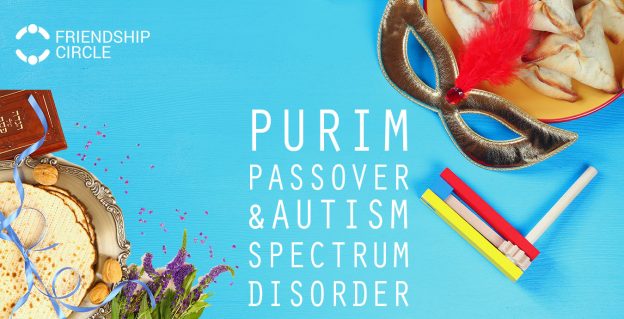
Jewish, Parenting
Purim, Passover, and Autism Spectrum Disorder: Recognizing and Dealing with the Challenges
The Jewish holiday of Purim starts next week; a month later, Passover will arrive. These holidays can be very stressful for children and adolescents who have autism spectrum disorder (ASD) and for their families. Observance of these holidays can impose social, sensory, and other demands that trigger the specific challenges created by the ASD. Parents whose children and adolescents receive special education services to address ASD-related challenges may be able to advocate for additional support from school and home-based providers.Changes in Routine
Many families observe the holiday of Purim by dressing in costumes, attending their synagogues in the evening to listen to the reading of a text called the Megillah, and producing loud noises at irregular intervals during the reading. Some families socialize at holiday meals and others participate in carnivals; some eat special foods. Families may start Passover preparation on the day after Purim ends, with intensive cleaning, organizing, shopping for food, and cooking. The primary forms of holiday observance are major changes in diet and participation in large family or community meals. Some families attend synagogue services and stay home from school and work. In many homes, the observance of the holidays includes the expectation of social interaction between family members and friends, changes from the usual routine, unusual food, transitions from home to synagogue or other places, and possible exposure to crowds. During Purim and Passover, children and adolescents may be expected to interact in their homes, synagogues, and at social events, with extended family members, family friends, and peers. There can be significant disruption in the home, particularly in the kitchen. Children may experience crowds at Megillah readings or at Passover seders.Stressful Situations
Children and adolescents who have ASD may find both holidays very stressful because these individuals typically struggle with social interaction, change, and sensory issues. ASD is a spectrum disorder, and there is wide variation in the manifestation of symptoms. However, the criteria for ASD includes deficits in the above-mentioned areas. The following information from the DSM-V Diagnostic Criteria for 299.00 Autism Spectrum Disorder (see https://www.cdc.gov/ncbddd/autism/hcp-dsm.html) describes individuals who have ASD as typically having difficulty with social interactions, making friends, change, and sensory issues:“Persistent deficits in social communication and social interaction across multiple contexts, difficulties … in making friends … absence of interest in peers … insistence on sameness, inflexible adherence to routines, … (e.g., extreme distress at small changes, difficulties with transitions, rigid thinking patterns, greeting rituals, need to … eat the same food every day) … hyper- or hyporeactivity to sensory input (e.g. adverse response to specific sounds or textures) …”
Parents often know that their children or adolescents who have ASD are unable to tolerate the social, sensory, or other demands of holiday celebrations. A client told me that his eight-year-old daughter refused to attend a Megillah reading, screaming that it was “too loud.” Another client told me that her three-year-old son had tantrums when she tried to introduce new foods at holiday meals (or any other time). One parent told me that her child tried to eat complete trays of any food within reach at synagogue events. Some children are sensory averse and refuse to allow their relatives to touch them; others who are sensory seeking may touch people inappropriately. Intolerance to change may be expressed through refusal to cooperate at holiday events. One parent reported that his fifteen-year-old refused to leave his bedroom during the family’s Passover seder. A parent told me that her daughter suffered during holidays and community celebrations because she was unable to make friends with any of the girls in the community.


